
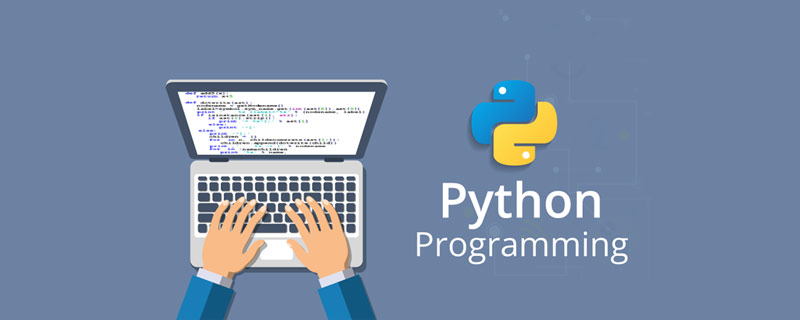
Article Directory
(Free learning recommendation:python video tutorial)
1. Preface
I crawled a lot of static before The content of web pages includes: novels, pictures, etc. Today I will try to crawl dynamic web pages. As we all know, Baidu Pictures is a dynamic web page. Then, rush! rush! ! rush! ! !
2. Libraries that need to be imported
import requestsimport jsonimport os
3. Implementation process
First, open Baidu and search for a content. The search here is for the male god (himself)——Peng Yuyan
Then, open the packet capture tool , select theXHRoption, pressCtrl R, and then you will find that as your mouse slides, one data packet after another will appear on the right.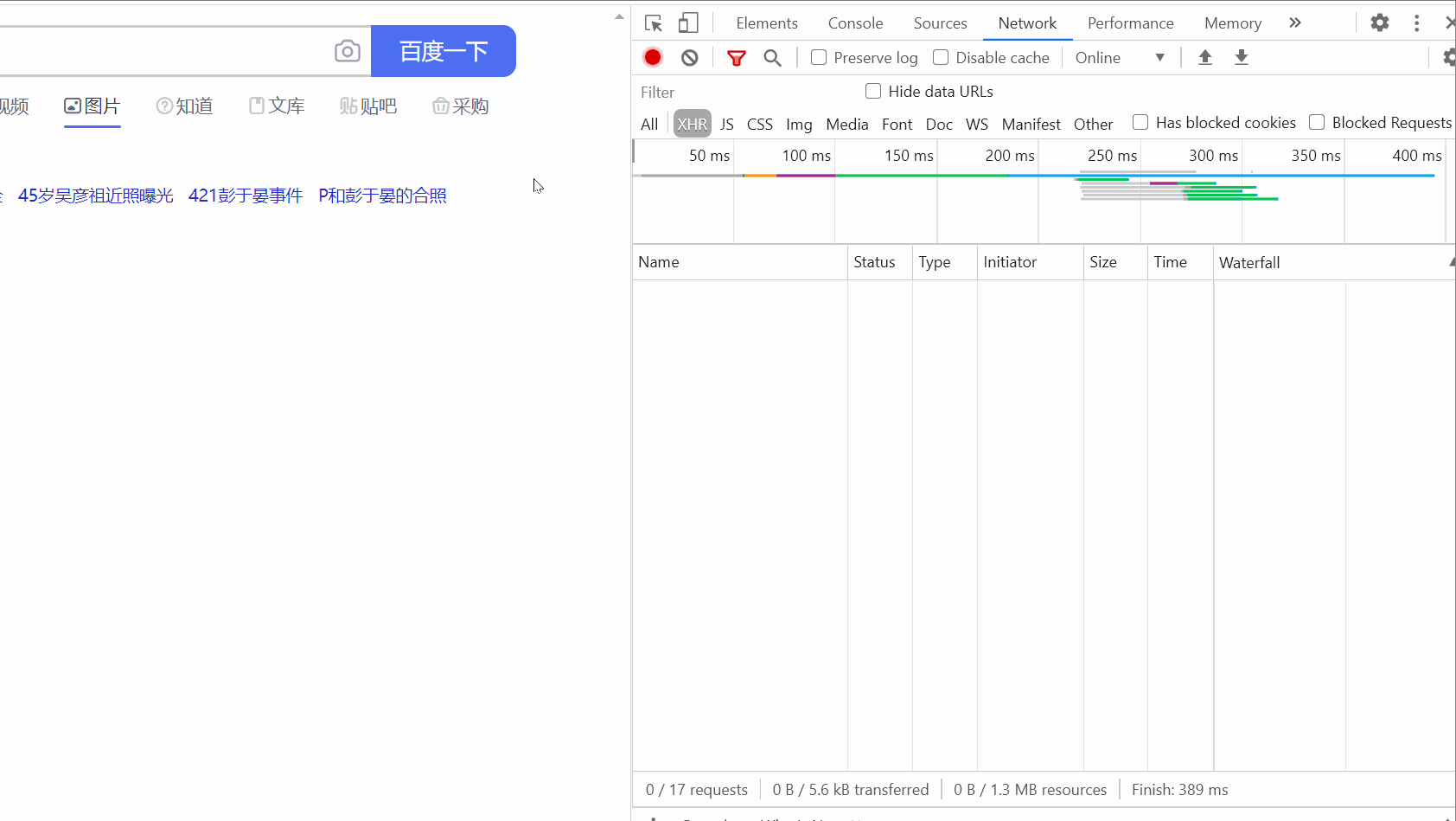
(There is not too much sliding here. At first, the GIF recorded was over 5M because of too much sliding.)
Then, select a package and view it headers, as shown in the figure: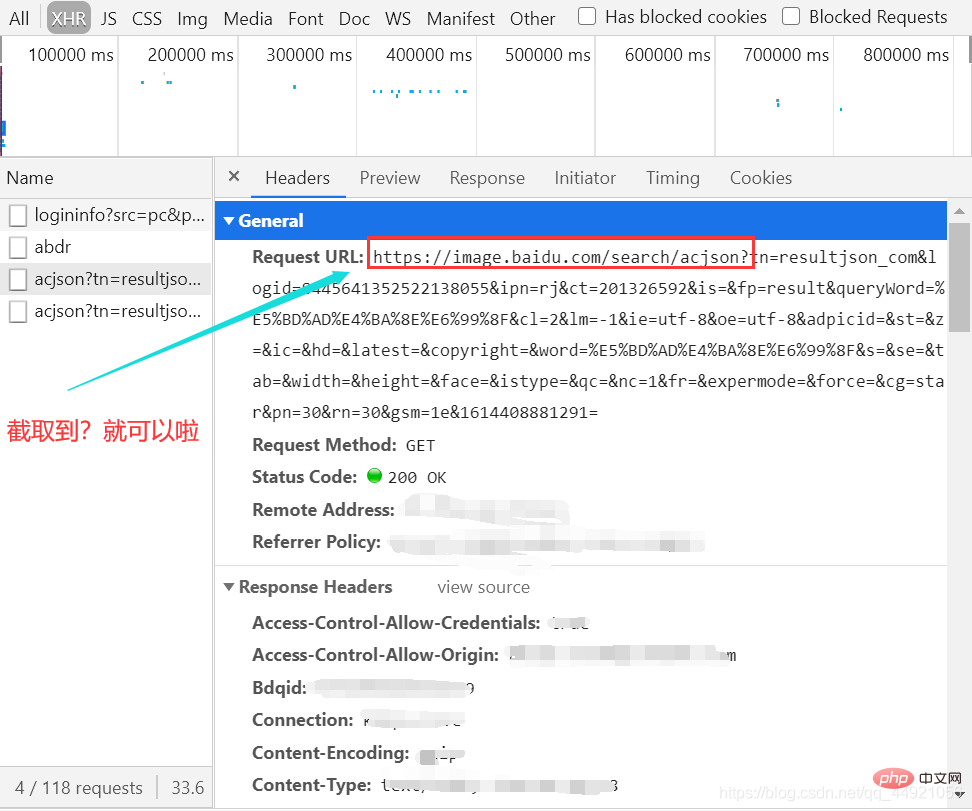
After intercepting, paste it on Notepad as a URL, which will be used later.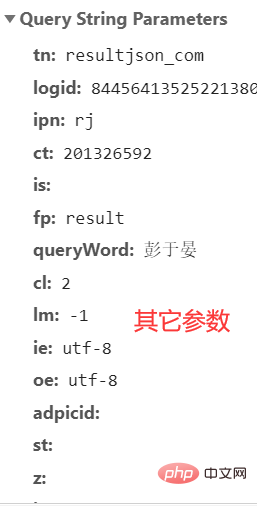
There are many, many parameters here, and I don’t know which ones can be ignored. I will simply copy them all in the following article. See the following article for details.
Here, the content that can be directly observed is over. Next, with the help of code, help us open the door to another world
That’s it!
First: Group the "other parameters" mentioned above together.
If you do it yourself, it is best to copy your own "Other parameters".
After that, we can try to extract it first, and change the encoding format to'utf-8'
url = 'https://image.baidu.com/search/acjson?' param = { 'tn': 'resultjson_com', 'logid': ' 7517080705015306512', 'ipn': 'rj', 'ct': '201326592', 'is': '', 'fp': 'result', 'queryWord': '彭于晏', 'cl': '2', 'lm': '-1', 'ie': 'utf-8', 'oe': 'utf-8', 'adpicid': '', 'st': '', 'z': '', 'ic': '', 'hd': '', 'latest': '', 'copyright': '', 'word': '彭于晏', 's': '', 'se': '', 'tab': '', 'width': '', 'height': '', 'face': '', 'istype': '', 'qc': '', 'nc': '1', 'fr': '', 'expermode': '', 'force': '', 'cg': 'star', 'pn': '30', 'rn': '30', 'gsm': '1e', } # 将编码形式转换为utf-8 response = requests.get(url=url, headers=header, params=param) response.encoding = 'utf-8' response = response.text print(response)
The running results are as follows: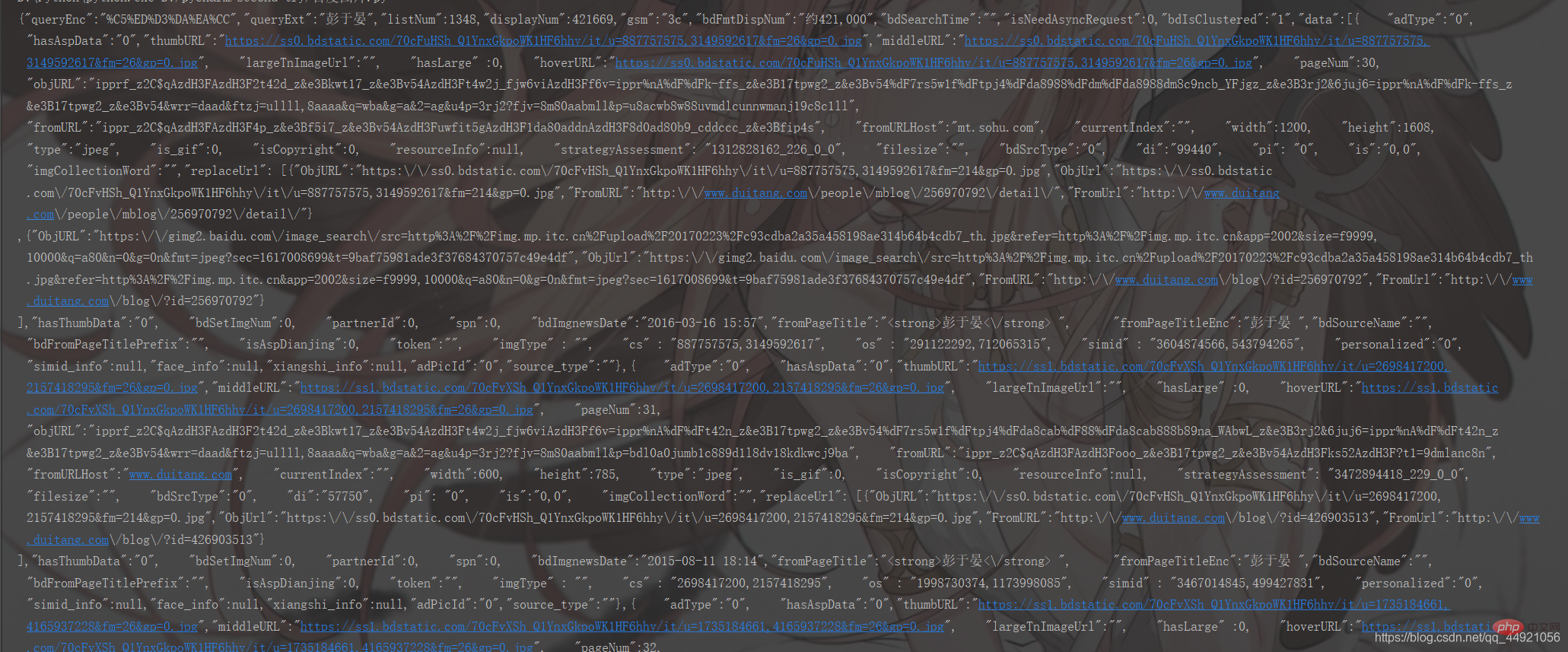
It looks quite messy. It’s okay. Let’s pack it up!
Add on the basis of the above:
# 把字符串转换成json数据 data_s = json.loads(response) print(data_s)
The running results are as follows: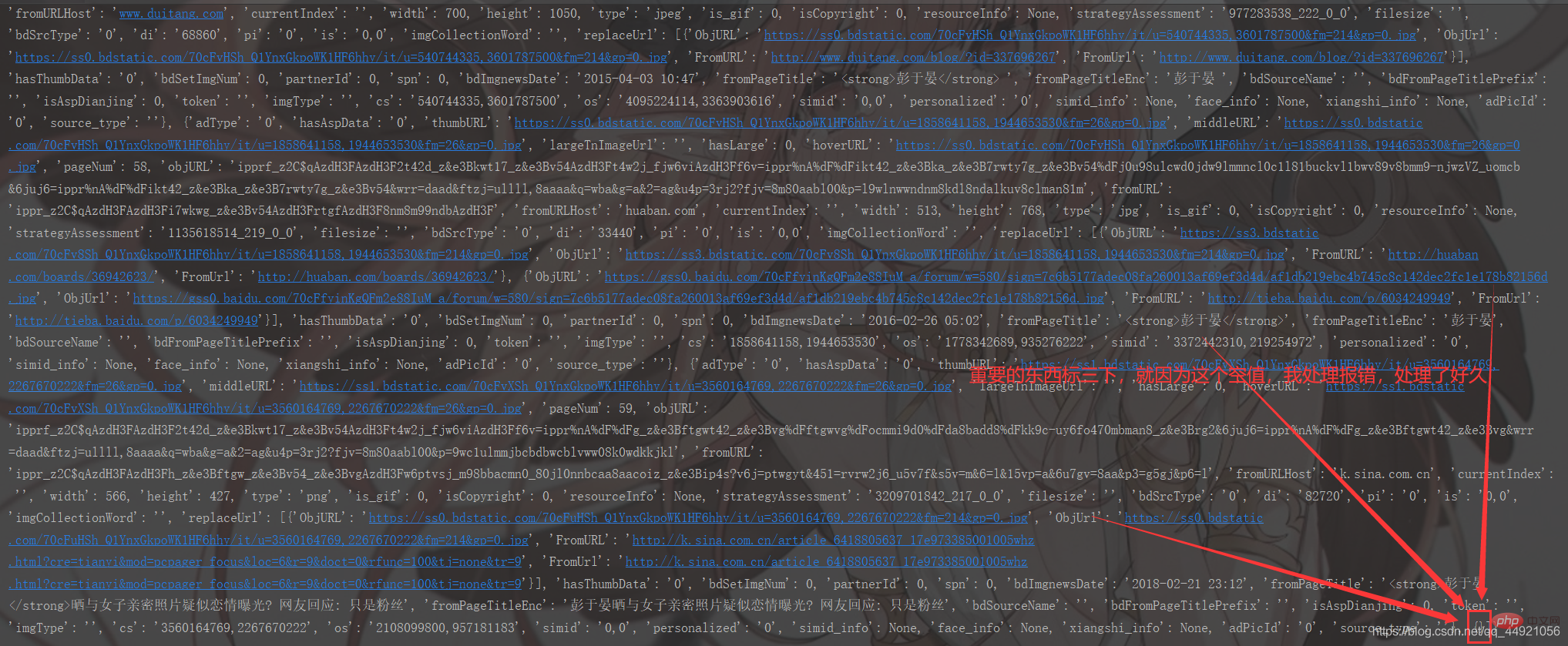
Compared with the above, it is much clearer, but it is still not clear enough. Why Woolen cloth? Because its printed format is not convenient for us to view!
There are two solutions to this.
①Import thepprintlibrary, then enterpprint.pprint(data_s), and you can print, as shown below
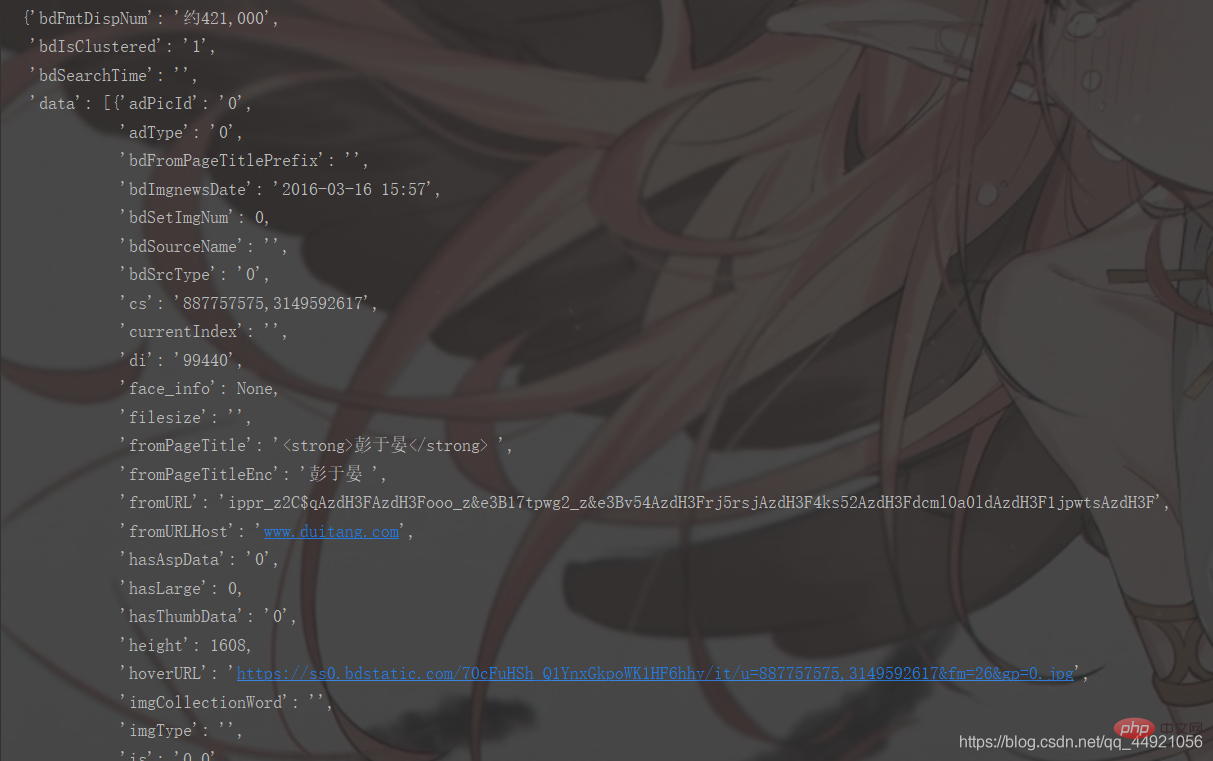
②Use the json online parser (by Baidu), the results are as follows: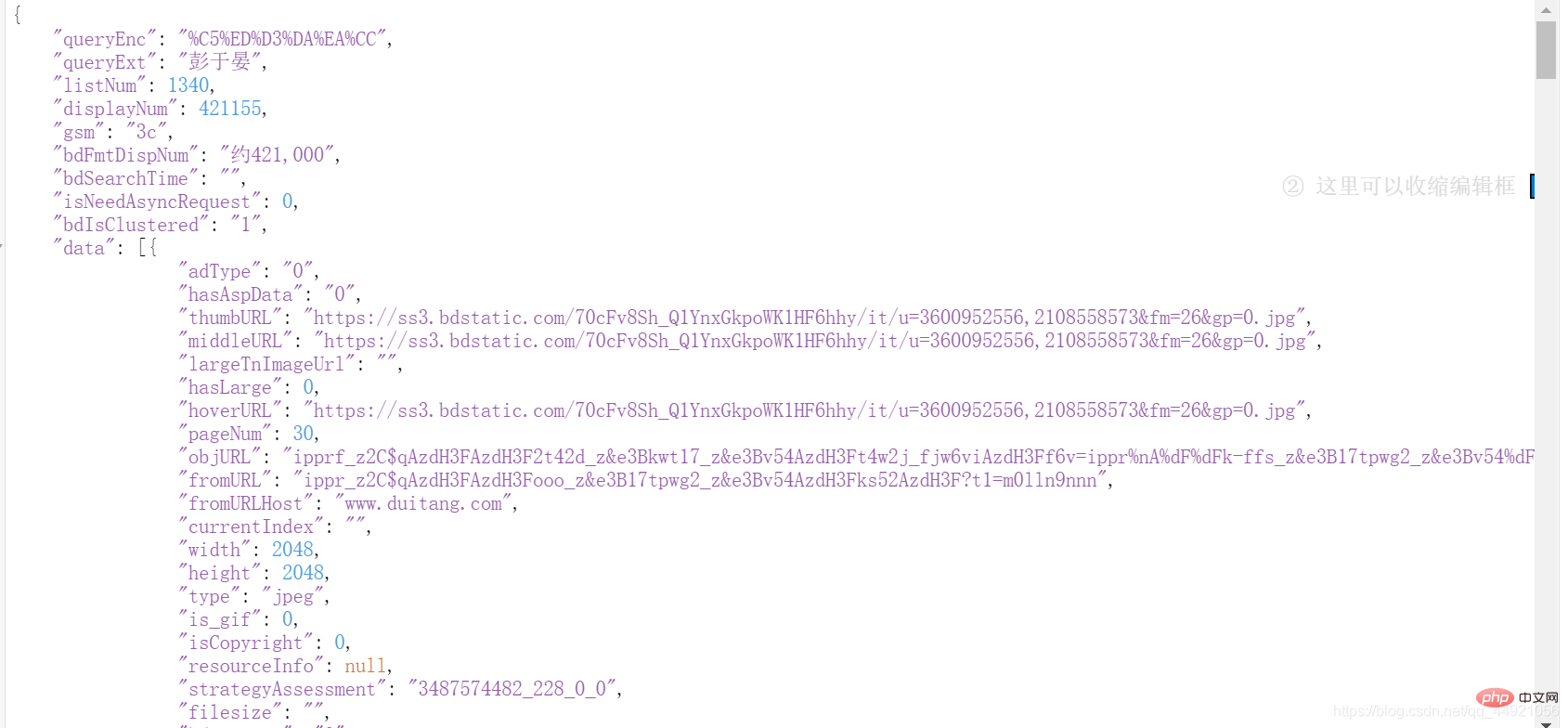
After solving the previous step, we will find that the data we want is all indataInside!
Then extract it!
a = data_s["data"] for i in range(len(a)-1): # -1是为了去掉上面那个空数据 data = a[i].get("thumbURL", "not exist") print(data)
The results are as follows: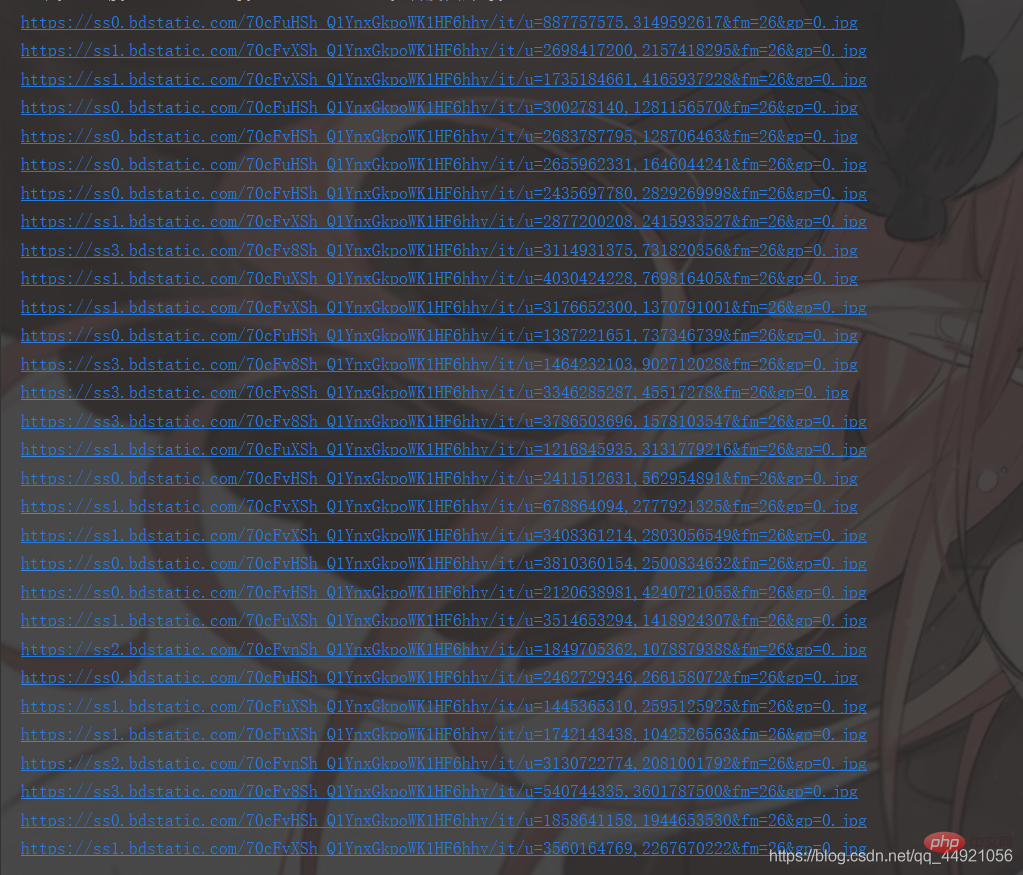
At this point, 90% of the success has been achieved. All that remains is to save and optimize the code!
This part is slightly different from the above. If you look carefully, you will find it!
# -*- coding: UTF-8 -*-""" @Author :远方的星 @Time : 2021/2/27 17:49 @CSDN :https://blog.csdn.net/qq_44921056 @腾讯云 : https://cloud.tencent.com/developer/user/8320044 """import requestsimport jsonimport osimport pprint# 创建一个文件夹path = 'D:/百度图片'if not os.path.exists(path): os.mkdir(path)# 导入一个请求头header = { 'User-Agent':'Mozilla/5.0 (Macintosh; Intel Mac OS X 11_1_0) AppleWebKit/537.36 (KHTML, like Gecko) Chrome/87.0.4280.88 Safari/537.36'}# 用户(自己)输入信息指令keyword = input('请输入你想下载的内容:')page = input('请输入你想爬取的页数:')page = int(page) + 1n = 0pn = 1# pn代表从第几张图片开始获取,百度图片下滑时默认一次性显示30张for m in range(1, page): url = 'https://image.baidu.com/search/acjson?' param = { 'tn': 'resultjson_com', 'logid': ' 7517080705015306512', 'ipn': 'rj', 'ct': '201326592', 'is': '', 'fp': 'result', 'queryWord': keyword, 'cl': '2', 'lm': '-1', 'ie': 'utf-8', 'oe': 'utf-8', 'adpicid': '', 'st': '', 'z': '', 'ic': '', 'hd': '', 'latest': '', 'copyright': '', 'word': keyword, 's': '', 'se': '', 'tab': '', 'width': '', 'height': '', 'face': '', 'istype': '', 'qc': '', 'nc': '1', 'fr': '', 'expermode': '', 'force': '', 'cg': 'star', 'pn': pn, 'rn': '30', 'gsm': '1e', } # 定义一个空列表,用于存放图片的URL image_url = list() # 将编码形式转换为utf-8 response = requests.get(url=url, headers=header, params=param) response.encoding = 'utf-8' response = response.text # 把字符串转换成json数据 data_s = json.loads(response) a = data_s["data"] # 提取data里的数据 for i in range(len(a)-1): # 去掉最后一个空数据 data = a[i].get("thumbURL", "not exist") # 防止报错key error image_url.append(data) for image_src in image_url: image_data = requests.get(url=image_src, headers=header).content # 提取图片内容数据 image_name = '{}'.format(n+1) + '.jpg' # 图片名 image_path = path + '/' + image_name # 图片保存路径 with open(image_path, 'wb') as f: # 保存数据 f.write(image_data) print(image_name, '下载成功啦!!!') f.close() n += 1 pn += 29
The running results are as follows:

Friendly reminder:
①: One page is 30 pictures
②: The input content can be varied: such as bridge, moon, sun, Hu Ge, Zhao Liying, etc.
4. Blogger’s speech
I hope you can like, follow, collect, and support it three times in a row!
A large number of free learning recommendations, please visitpython tutorial(Video)
The above is the detailed content of python crawler: crawl Baidu pictures as you like. For more information, please follow other related articles on the PHP Chinese website!